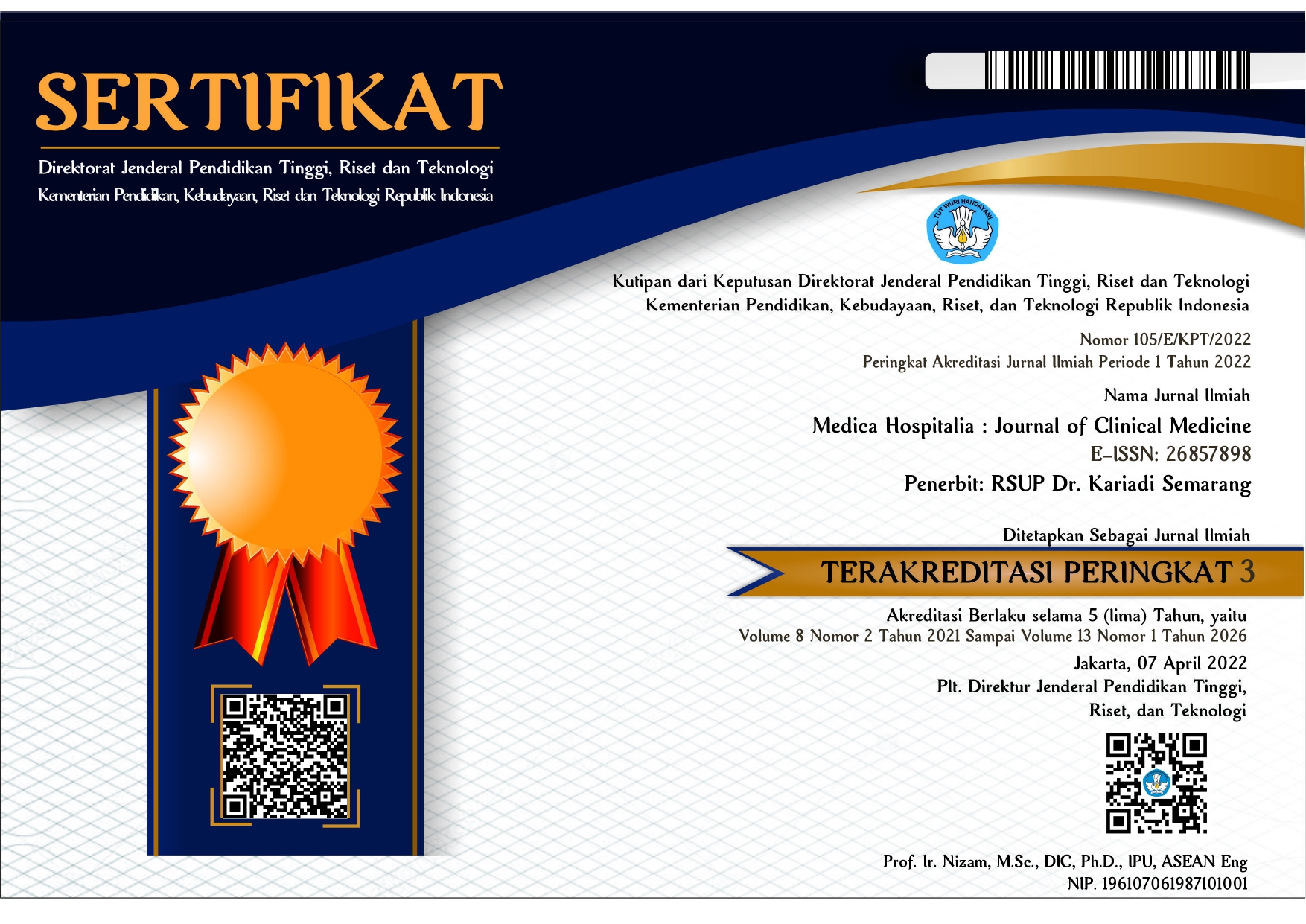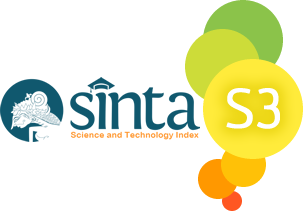Curcumin for Quality of Life of Multiple Myeloma Patients: a Randomized, Placebo-Controlled Trial
Curcumin for Quality of Life of Multiple Myeloma Patients: a Randomized, Placebo-Controlled Trial
DOI:
https://doi.org/10.36408/mhjcm.v9i2.757Keywords:
myeloma, curcumin, QoL scores, role function, symptom insomniaAbstract
Background : The main goal of multiple myeloma (MM) therapy is to control the disease, prolong the survival, and improve the life quality. Curcumin affects pro-inflammatory cytokines. There is no research yet that has been conducted to evaluate the effects of curcumin on increasing MM patient's life quality. Objective of this study is to evaluate the effect of curcumin on increasing MM patients' life quality.
Methods : Of 24 MM patients were enrolled and were divided randomly into treatment groups (n=12) and controls (n=12). Patients in treatment group received melphalan 4 mg/m2, prednisone 40 mg/m2 (MP) for 7 days and curcumin 8 grams/day for 28 days. The control group received MP and placebo. Quality of life (QoL) scores were measured in early diagnosis and after 4 cycles of treatment. The difference between two groups was analyzed using Mann-Whitney U-Test or Independent T Test.
Results : The role function score of the treatment group was better than control. There is a significant difference function score of patients between the treatment and control group, at baseline and 4 cycles treatment (41.66 ± 3.85 vs. 23.61 ± 3.36; 95.83 ± 1.03 vs
76.39 ± 2.51; p=0.022). There was significantly different of insomnia score between treatment and control goup at baseline and the end 4 cycles (41.67 ± 3.79 vs 58.33 ± 3.51; 9.72 ± 1.5 vs 25 ± 1.32; p=0.02).
Conclusion : The addition of curcumin in myeloma patients enhances the QoL score, role function score and lowered symptom insomnia.
Downloads
References
Rajkumar SV, Dimopoulos MA, Palumbo A, Blade J, Merlini G, Mateos M, et al. International Myeloma Working Group updated criteria for the diagnosis of multiple myeloma. The Lancet Oncology. 2014;15(12):e538–e548.
Becker N. Multiple Myeloma. Recent Result in Cancer Research. 2011;183:25–35.
MacEwan JP, Batt K, Yin W, Peneva D, Sison S, Vine S, et al.
Economic burden of multiple myeloma among patients in successive lines of therapy in the United States. Leukemia and lymphoma. 2017;0(0):1–9.
Bladé J, Rosiñol L. Complications of Multiple Myeloma. Hematology/Oncology Clinics of North America. 2007;21(6):1231–1246.
Niscola P, Scaramucci L, Romani C, Giovannini M, Tendas A, Brunetti G, et al. Pain management in multiple myeloma. Expert Review of Anticancer Therapy. 2010;10(3):415–425.
Maes H, Delforge M. Optimizing quality of life in multiple myeloma patients: current options, challenges, and recommendations. Expert Review of Hematology. 2015;8(3):355–366.
Mikhael JR, Dingli D, Roy V, Reeder CB, Buadi FK, Hayman SR, et al. Management of newly diagnosed symptomatic multiple myeloma: Updated mayo stratification of myeloma and risk- adapted therapy (msmart) consensus guidelines 2013. Mayo Clinic Proceedings. 2013;88(4):360–376.
Greer JP; Arber DA; Glader B; List AF; Means RT; Paraskevas F. Wintrobe's Clinical Hematology. 13th ed. California: Lippincott Williams and Wilkin; 2010.
Esma F, Salvini M, Troia R, Boccadoro M, Larocca A, Pautasso C. Melphalan hydrochloride for the treatment of multiple myeloma. Expert Opinion on Pharmacotherapy. 2017;18(11):1127–1136.
Shanmugam MK, Rane G, Kanchi MM, Arfuso M, Chinnathambi A, Zayed ME, et al. The multifaceted role of curcumin in cancer prevention and treatment. Molecules. 2015;20(2):2728–2769.
Wilken R, Veena MS, Wang MB, Srivatsan ES. Curcumin: A review of anti-cancer properties and therapeutic activity in head and neck squamous cell carcinoma. Molecular Cancer. 2011;10(1):12.
He Z-Y, Shi C-B, Wen H, Li F-L, Wang B-L, Wang J. Upregulation of p53 expression in patients with colorectal cancer by administration of curcumin. Cancer Investigation. 2011;29(3):208–213.
Garcea G, Berry DP, Jones DJL, Singh R, Dennison AR, Farmer PB, et al. Consumption of the putative chemopreventive agent curcumin by cancer patients: Assessment of curcumin levels in the colorectum and their pharmacodynamic consequences. Cancer Epidemiology, Biomarkers, and Prevention. 2005;14(1):120–125.
Kanai M. Therapeutic applications of curcumin for patients with pancreatic cancer. World Journal of Gastroenterology. 2014;20(28):9384–9391.
Dhillon N, Aggarwal BB, Newman RA, Wolff RA, Kunnumakkara AB, Abbruzzese JL, et al. Phase II trial of curcumin in patients with advanced pancreatic cancer. Clinical Cancer Research. 2008;14(14):4491–4499.
Kanai M, Otsuka Y, Otsuka K, Sato M, Nishimura T, Mori Y, et al. A phase I study investigating the safety and pharmacokinetics of highly bioavailable curcumin in cancer patients. Cancer Chemotherapy and Pharmacology. 2013;71(6):1521–1530.
Taleban Forough-Azam, Rastmanesh Reza, Hejazi Jalal, Molana Seyed-Hadi EG. A pilot clinical trial of radioprotective effects of curcumin supplementation in patients with prostate cancer. Journal of Cancer Science and Therapy. 2013;5(10):320–324.
Ide H, Tokiwa S, Sakamaki K, et al. Combined inhibitory effects
of soy isoflavones and curcumin on the production of prostate- specific antigen. The Prostate. 2010;70(10):1127–1133.
Kim SG, Veena MS, Basak SK, Han E, Tajima T, Gjertson DW, et al. Curcumin treatment suppresses IKKβ kinase activity of salivary cells of patients with head and neck cancer: A pilot study. Clinical Cancer Research. 2011;17(18):5953–5961.
Golombick T, Diamond TH, Badmaev V, Manoharan A, Ramakrishna R. The potential role of curcumin in patients with monoclonal gammopathy of undefined significance – Its effect on paraproteinemia and the urinary N-telopeptide of type I collagen bone turnover marker. Clinical Cancer Research. 2009;15(18):5917–5922.
Zaidi A, Lai M, Cavenagh J. Long-term stabilization of myeloma with curcumin. BMJ Case Reports. 2017:1–7.
Golombick T, Diamond TH, Manoharan A, Ramakrishna R. Long–term use of curcumin in two smoldering multiple myeloma patients. Journal of Hematological Malignancies. 2013;3(1):18–23.
Osborne TR, Ramsenthaler C, Siegert RJ, Edmonds PM, Schey SA, Higginson IJ. What issues matter most to people with multiple myeloma and how well are we measuring them? A systematic review of quality of life tools. European Journal of Haematology. 2012;89(6):437–457.
Sanmukhani J, Satodia V, Trivedi J, Patel T, Tiwari D, Panchal B, et al. Efficacy and safety of curcumin in major depressive disorder: a randomized controlled trial. Phytotherapy Research. 2014;28(4):579–585.
Induru RR, Walsh D. Cancer-related insomnia. American Journal of Hospice & Palliative Medicine. 2014, Vol. 31(7) 777–785.
Waage A, Gimsing P, Fayers P, Abildgaard N, Ahlberg L, Bjorkstrand B, et al. Melphalan and prednisone plus thalidomide or placebo in elderly patients with multiple myeloma. Blood. 2010;116(9):1405–1412.
King MT. The interpretation of scores from the EORTC quality of life questionnaire QLQ-C30. Quality of Life Research. 1996;5(6):555–567.
Iva S; Soeharti C; Tobing ML; Suyono; Pangarsa EA. Characteristic patients with multiple myeloma at Dr. Kariadi Hospital Semarang. Acta Interna The Journal of Internal Medicine. 2015;5(1).
Additional Files
Published
How to Cite
Issue
Section
Citation Check
License
Copyright (c) 2022 Anindita Rosenda Eka Hendrawati, Damai Santosa, Dharminto, Catharina Suharti

This work is licensed under a Creative Commons Attribution-ShareAlike 4.0 International License.
Copyrights Notice
Copyrights:
Researchers publishing manuscrips at Medica Hospitalis: Journal of Clinical Medicine agree with regulations as follow:
Copyrights of each article belong to researchers, and it is likewise the patent rights
Researchers admit that Medica Hospitalia: Journal of Clinical Medicine has the right of first publication
Researchers may submit manuscripts separately, manage non exclusive distribution of published manuscripts into other versions (such as: being sent to researchers’ institutional repository, publication in the books, etc), admitting that manuscripts have been firstly published at Medica Hospitalia: Journal of Clinical Medicine
License:
Medica Hospitalia: Journal of Clinical Medicine is disseminated based on provisions of Creative Common Attribution-Share Alike 4.0 Internasional It allows individuals to duplicate and disseminate manuscripts in any formats, to alter, compose and make derivatives of manuscripts for any purpose. You are not allowed to use manuscripts for commercial purposes. You should properly acknowledge, reference links, and state that alterations have been made. You can do so in proper ways, but it does not hint that the licensors support you or your usage.

























